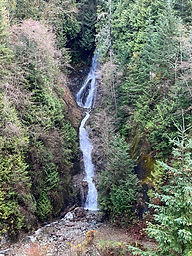Paddler Problems
- kc dyer

- Sep 22, 2025
- 4 min read
Campsite application by U.S. school stirs controversy

An American firm applying for a "licence of occupation" for 77 individual camping sites along the BC coastline is receiving pushback from a number of local residents and stakeholders, including First Nations.
A Crown Land File application #1412379 has been filed by the National Outdoor Leadership School (NOLS), a Wyoming-based global wilderness school that, according to their website, "believes in the transformative power of leadership through wilderness education".
The school has been operating as a non-profit since 1965, and offers wilderness training camps around the world, including to American military and service personnel. In their application they say they have been running sea kayaking expeditions into BC waters since 1995.
NOLS is seeking "a licence of occupation" for the sites in order to use them for overnight camping locations on guided kayaking adventures. Most of the sites are reachable only by water, and range along both the east and west coasts of Vancouver Island, and along the central coast of the mainland. According to the information presented by the company, each site is likely to be used three or fewer times per year. They say they have no plans to build structures at these camping locations and will maintain 'leave-no-trace" practices.
Public concern about this application has been widespread, particularly in coastal communities. A post by Kathleen McKinnell to the Texada Island Facebook page received thousands of shares and comments.
McKinnell, a Lasqueti Island resident, is concerned about the lack of consultation with the affected First Nations. "Our Islands trust has adopted a policy to consult First Nations," she says.
One of the named sites is Sea Egg Cove on Lasqueti Island, which McKinnell notes is in a remote location with no road access and therefore no available firefighting service.
In her letter of response to the application, McKinnell raises a number of concerns, including the commercial use of Crown Land, "This proposal conflicts with the island's commercial recreation principles, risks setting a dangerous precedent for future commercial ventures, presents unacceptable fire and safety risks, and has failed to adequately involve or inform key local stakeholders," she says.
In another letter of response to the application, Becky Rippel, a Canadian expedition guide with more than 30 years of international experience, outlined her concerns about gaps in critical oversight left open by the proposal. She notes that NOLS publicly advertises military training programs and queries the type of training taking place on Canadian land. "Who are the participants (e.g., foreign military, intelligence trainees)? Are drones or surveillance technologies being deployed without oversight?"
Rippel recommends that prior to considering any such applications made by foreign companies, the BC government should "initiate consultations with Canadian expedition leaders, Indigenous stakeholders, and national security experts, in order to develop a modern regulatory framework for foreign land use on Crown land, rooted in reciprocity, accountability, and sovereignty."
In a statement, the First Nations Leadership Council (FNLC) called on the province to consult and cooperate with potentially affected First Nations "in order to obtain their free, prior, and informed consent" before a decision is made regarding this wide-ranging application.
The FNLC say they are "gravely concerned" that the application doesn't acknowledge First Nation title and rights holders or potential impacts, including ecological, cultural, and spiritual. The statement goes on to say that the "initial filing of this application by NOLS has circumvented and undermined local governance, proceeding without meaningful consultation and cooperation with First Nations or local communities."
"First Nations have lived on and cared for these lands since time immemorial," said Chief Don Tom, Vice-President of the Union of BC Indian Chiefs (UBCIC). "Our ancestors established these sites as places of sustenance, culture, and governance, and they remain integral to our identity and survival. To see an American-based company attempt to occupy our ancient village sites without consent is deeply unacceptable and is a violation of our inherent rights, title, laws, and jurisdiction."
Hugh Braker, a member of the First Nations Summit Political Executive, said that the application highlights the problems with Crown land policy in BC.
"For far too long, First Nations in BC have been treated as an afterthought in land management decisions, when our title and rights should be central to every decision about our homelands. The province’s failure to meaningfully consult and cooperate on an application of this scale—covering 77 sites, many of them sacred and culturally significant—shows the broken nature of the system. B.C. must understand that these lands are not simply vacant spaces to be carved up for corporate profit. They are living places of history, culture, and governance, and they must be protected.”
Public consultation on this application is open, and comments can be submitted HERE until October 5.
The Watershed values your thoughts. Leave your comments below, or email us at editor@lionsbaywatershed.ca
Like what you're reading? For as little as $5/month, you can support local independent journalism by subscribing to The Watershed HERE.





Comments